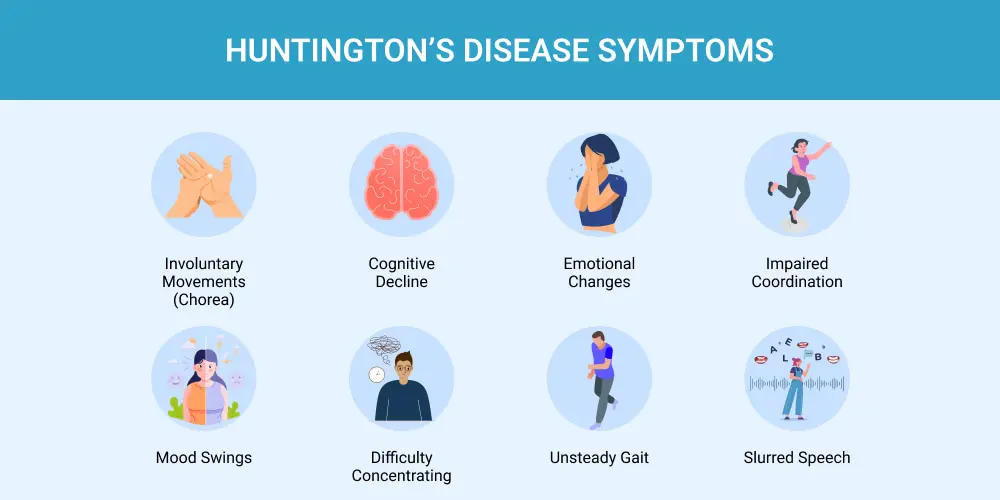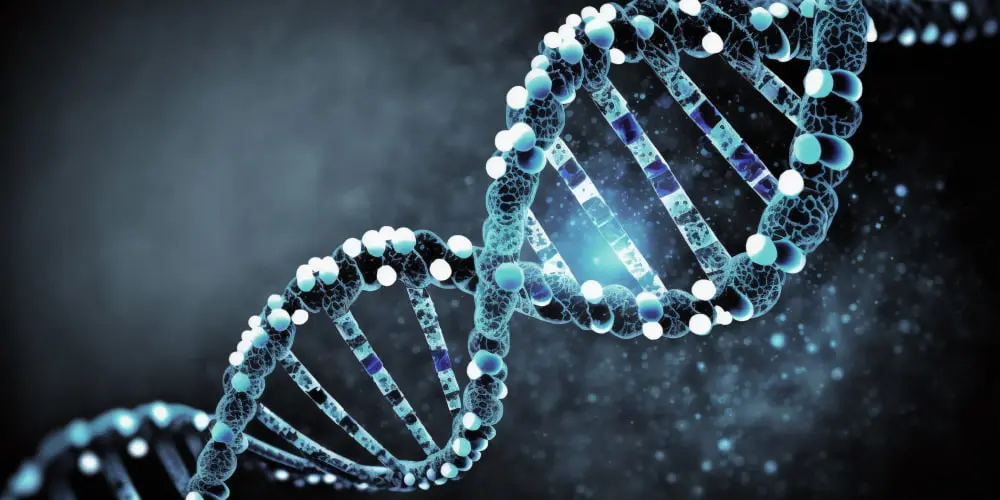Unveiling its enigmatic layers, this disorder, propelled by a mutation in the HTT gene, orchestrates a symphony of complexities in the brain, disrupting movement, cognition, and emotional harmony. Beyond its rarity and incurability, Huntington’s disease casts individuals into an extraordinary struggle, confronting the gradual erosion of motor control, cognitive prowess, and emotional equilibrium. Embark with us on a unique exploration of the labyrinthine landscape of Huntington’s disease. This blog post ventures into the genetic nuances unravels the cryptic symptoms, and illuminates the cutting-edge strides in research and treatment. Join our odyssey to foster a profound understanding of HD, kindling hope and solutions for those trapped by its tenacious grasp.
Huntington’s Disease: Overview
Huntington’s disease is a complex genetic disorder. It manifests in various symptoms that impact both physical and mental well-being. Recognizing these signs is crucial for early intervention and management.
What Is Huntington’s Disease?
Huntington’s Disease (HD) is a hereditary condition affecting the brain’s nerve cells. It leads to progressive cognitive decline and physical deterioration.
Early identification of symptoms is vital for timely intervention. Common signs include:
- Involuntary movements (chorea)
- Cognitive decline
- Emotional changes
- Impaired coordination
Identifying symptoms in the early stages enhances the quality of life for individuals with HD. Look out for:
- Mood swings
- Difficulty concentrating
- Unsteady gait
- Slurred speech
Understanding the underlying mechanisms helps grasp the disease’s progression. HD is characterized by:
- Genetic mutation (HTT gene)
- Accumulation of abnormal proteins
- Neuronal cell death in specific brain areas
Recognizing Huntington’s Disease Symptoms: A Comprehensive Overview
Huntington’s disease is challenging. Recognizing its symptoms empowers individuals to navigate the journey more effectively. Let’s break down the critical aspects of HD symptoms, shedding light on the early signs and the disease’s pathophysiology.
- Involuntary Movements (Chorea):
- What is it? Uncontrolled, jerky movements.
- Symptoms: frequent, unpredictable motions affecting arms, legs, and face.
- Cognitive Decline:
- What is it? Progressive deterioration in thinking abilities.
- Symptoms: memory loss, difficulty focusing, impaired decision-making.
- Emotional Changes:
- What is it? Shifts in mood and behavior.
- Symptoms: depression, anxiety, and irritability.
- Impaired Coordination:
- What is it? Difficulty controlling movements.
- Symptoms: unsteady gait, balance issues.
- Mood Swings:
- Huntington Disease Early symptoms: early signs affecting emotional well-being.
- Symptoms: unexplained mood swings and sudden changes in demeanor.
- Difficulty Concentrating:
- Early Symptoms: Early Cognitive Challenges.
- Symptoms: trouble focusing on tasks; forgetfulness.
- Unsteady Gait:
- Early Symptoms: Early motor skill issues.
- Symptoms: difficulty walking steadily; frequent stumbling.
- Slurred Speech:
- Huntington Disease Early Symptoms: Early speech-related changes.
- Symptoms: difficulty articulating words clearly.
Huntington Disease Pathophysiology: Unveiling the Mechanisms
Understanding the disease’s pathophysiology provides insights into its progression. And it aids in developing effective interventions.
- Genetic Mutation (HTT Gene):
What is it? Abnormality in the HTT gene.
Role: triggers the production of mutated huntingtin protein.
Huntington Disease Pathophysiology: The genetic basis influencing disease onset.
Impact: Mutation leads to the production of toxic proteins.
- Accumulation of Abnormal Proteins:
What is it? The buildup of mutated huntingtin protein.
Impact: Disrupts normal cellular function, causing toxicity.
- Neuronal Cell Death in Specific Brain Areas:
What is it? Progressive loss of nerve cells in specific brain regions.
Consequence: impairs motor and cognitive functions.
Understanding Huntington’s disease symptoms. Especially in the early stages, it is crucial for proactive management. Recognize the signs and delve into the disease’s pathophysiology. Individuals and their support systems can navigate the challenges more effectively. They foster a better quality of life despite the complexities of Huntington’s disease.
Huntington’s Disease Symptoms
Huntington’s disease is a genetic disorder with far-reaching implications. It manifests through a spectrum of symptoms. These symptoms significantly impact various facets of an individual’s life. This exploration aims to delve deeper into the nuanced manifestations of symptoms. It offers insights into their multifaceted nature.
- Involuntary Movements (Chorea):
- Chorea is the main thing that shows up in Huntington’s disease.
- It means unpredictable, involuntary movements in different body parts.
- Distinctive Characteristic:
- Chorea is the most noticeable thing in Huntington’s disease.
- It makes unpredictable movements in the body.
- Physical Challenges:
- These movements make daily activities harder.
- Things like eating or getting dressed become more complex.
- Management Strategies:
- Managing chorea is essential for a better life with Huntington’s disease.
- It might involve medicine, physical therapy, and special techniques for each person.
- Understanding Challenges:
- Knowing how chorea affects the body is essential.
- It helps the people facing it, caregivers, and healthcare professionals to give better support.
Motor Dysfunction
This category focuses on the motor symptoms associated with Huntington’s disease, including impaired coordination, involuntary movements (chorea), and difficulties with motor planning and execution.
Cognitive Impairment
Under this heading, we explore the cognitive symptoms of Huntington’s disease, such as a decline in memory, reasoning abilities, and overall cognitive function, shedding light on the impact on daily life and decision-making.
Emotional and Behavioral Changes
This section delves into the emotional and behavioral aspects of Huntington’s disease, addressing symptoms like mood swings, depression, anxiety, and an altered personality. By examining these changes, we aim to enhance our understanding of the complex mental health challenges faced by individuals affected by the condition.
Recognizing Early Symptoms of Huntington’s Disease
Huntington’s disease presents unique challenges. However, early recognition of Huntington’s disease symptoms is crucial for proactive management. Let’s straightforwardly explore the key indicators to empower individuals and their families.
- Involuntary Movements (Chorea):
- Description: Unpredictable jerky movements are a hallmark of Huntington’s disease.
- Early signs: noticeable fidgeting or twitching in the limbs or face.
- Importance: Early identification allows for timely intervention and symptom management.
- Cognitive Changes:
- Description: Gradual decline in cognitive functions.
- Early signs: forgetfulness, difficulty concentrating.
- Significance: Recognizing cognitive shifts early enables strategies for daily functioning and planning.
- Emotional Swings:
- Description: mood swings and heightened emotional responses.
- Early signs: unexplained emotional changes, irritability.
- Impact: Understanding emotional shifts aids in providing appropriate support.
- Motor Skill Challenges:
- Description: Impaired coordination affects movements.
- Early signs: unsteady gait; difficulties in delicate motor tasks.
- Importance: Early recognition informs tailored interventions to address motor challenges.
- Speech Changes:
- Description: Slurred or hesitant speech.
- Early signs: difficulty articulating words clearly.
- Significance: Recognizing speech changes early allows communication strategies to be implemented.
Why Early Recognition Matters:
- Timely Intervention:
- Early identification allows for prompt medical evaluation and intervention.
- It enables healthcare professionals to implement strategies to manage Huntington’s disease symptoms effectively.
- Quality of Life:
- Early recognition facilitates the development of tailored care plans.
- Enhances the overall quality of life by addressing specific challenges in the early stages.
- Support Systems:
- Help healthcare individuals and their families build robust support systems.
- Allows for the implementation of emotional and practical support strategies.
- Empowerment:
- Knowing Huntington disease’s early symptoms empowers individuals to engage in their healthcare.
- Encourages a proactive approach to managing the disease.
Recognizing Patterns and Seeking Help:
- Observation:
- Regularly observe any changes in movement, cognition, emotions, or speech.
- Recognize patterns or persistent alterations in behavior.
- Consultation:
- If early signs are noticed, seek consultation with a neurologist.
- Timely professional assessment is crucial for accurate diagnosis and intervention.
- Genetic Testing:
- Genetic testing is available for individuals with a family history of Huntington’s disease.
- Genetic testing provides clarity and allows for early planning and support.
- Community Resources:
- Access community resources and support groups for individuals and families facing Huntington’s disease.
- Shared experiences and information can be valuable in navigating the journey.
Seeking timely professional guidance contributes to a more informed approach to living with HD. It’s a proactive way to improve the quality of life. Recognizing Huntington’s early disease symptoms empowers individuals to manage the disease effectively.
Pathophysiology of Huntington’s Disease
Understanding the underlying mechanisms of Huntington’s disease is essential for grasping its progression. Let’s delve into the critical aspects of pathophysiology in straightforward terms:
- Genetic Mutation (HTT Gene):
- Description: Abnormality in the HTT gene triggers the onset of Huntington’s disease.
- Mechanism: production of mutated huntingtin protein, a key contributor to the disease.
- Accumulation of Abnormal Proteins:
- Description: Buildup of mutated huntingtin protein in the brain.
- Impact: disruption of normal cellular functions, leading to toxicity and cellular damage.
- Neuronal Cell Death:
- Description: Progressive loss of nerve cells, especially in specific brain regions.
- Consequence: impaired motor and cognitive functions due to decreased neural connectivity.
- Neuroplasticity and Adaptation:
- Role: The brain’s attempt to adapt to the ongoing cellular changes.
- Outcome: activation of neuroplasticity, which contributes to the reorganization of neural circuits.
- Striatal Atrophy:
- Description: Gradual shrinkage of the striatum, a crucial brain structure.
- Impact: impaired control over movement and coordination are hallmark features of Huntington’s disease.
Why does pathophysiology matter?
- Treatment Approaches:
- Understanding Huntington’s disease pathophysiology guides the development of targeted treatments.
- Therapies aim to address the genetic and cellular aspects implicated in Huntington’s disease.
- Early Detection:
- Pathophysiological insights aid in the early detection of cellular changes.
- Early detection allows for interventions before substantial damage occurs.
- Research and Innovation:
- Ongoing research focuses on understanding the intricacies of pathophysiology.
- Innovations stem from a more profound comprehension, paving the way for potential breakthroughs.
- Holistic Care Strategies:
- Holistic care plans are tailored based on specific pathophysiological aspects.
- Comprehensive strategies encompass medical, emotional, and lifestyle components.
Understanding the pathophysiology of HD is like creating a roadmap for researchers and those affected. This knowledge also helps individuals with HD make informed decisions about their care.
Conclusion
What is Huntington’s disease? It’s essential to understand Huntington’s disease for proper care. Recognizing early symptoms is crucial. Understanding how the disease works benefits individuals, families, and healthcare professionals. Finding the disease early allows for timely help and targeted treatments. Our goal is to support those facing Huntington’s disease. We want to help them make informed decisions. We hope to assist them in navigating their journey with resilience.
FAQ
What are the first signs of Huntington’s disease?
It includes involuntary movements, cognitive decline, emotional swings, impaired coordination, and speech difficulties.
How is Huntington’s disease diagnosed?
Diagnosis involves a comprehensive process. It includes clinical assessments and genetic testing to identify the mutated HTT gene. And neurological examinations for confirmation.
Can Huntington’s disease be cured or prevented?
Currently, there is no cure for Huntington’s disease. Management focuses on symptom relief and supportive care. No specific preventive measures exist.
How does Huntington’s disease affect daily life?
The disease progressively impacts motor and cognitive functions. It influences daily activities, relationships, and overall quality of life. Adaptive strategies and support systems play a crucial role in managing these effects.












Please, leave your review
Write a comment: